Elemental
 for some peril, thematic elements and brief language.
for some peril, thematic elements and brief language.
Reviewed by: Nicole Granath
CONTRIBUTOR
| Moral Rating: | Average (somewhat offensive) |
| Moviemaking Quality: |
|
| Primary Audience: | Family |
| Genre: | Animation Adventure Comedy 3D |
| Length: | 1 hr. 43 min. |
| Year of Release: | 2023 |
| USA Release: |
June 16, 2023 (wide release) DVD: September 26, 2023 |
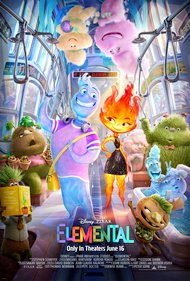

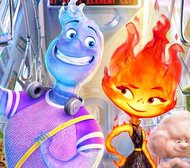
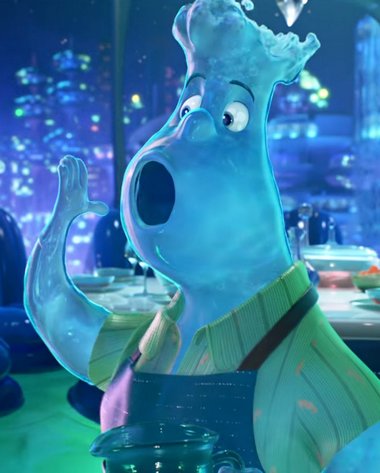
“Elemental” draws inspiration from director Peter Sohn’s youth, growing up as the son of Korean immigrants in New York City during the 1970s, highlighting the city’s distinct cultural and ethnic diversity.
Director Sohn also has said, “This movie is about thanking your parents and understanding their sacrifices.”
What is LYING? What are the truly BIG lies of our world?
What is TRUTH? Answer
Anger in the Bible

Prejudice
Racism
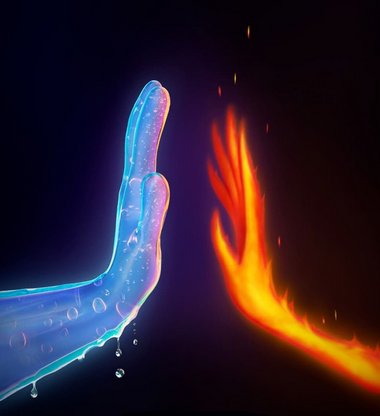
Romance between opposites
While they cannot touch each other, Ember (fire) and Wade (water) protect their identity against strong men and women and their own family while they attempt to make their relationship work. If she touched the water, she would be extinguished.
Ember is portrayed as tough, quick-witted, and quick tempered.
Wade is portrayed as fun, sappy and very emotional—crying at the drop of a hat. He wears his emotions on his sleeve. He goes with the flow.
The Disney Company’s history of inserting unnecessary homosexuality, transgenderism, politically correct identity politics, and occultism, into their films
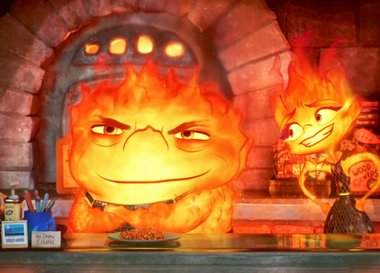
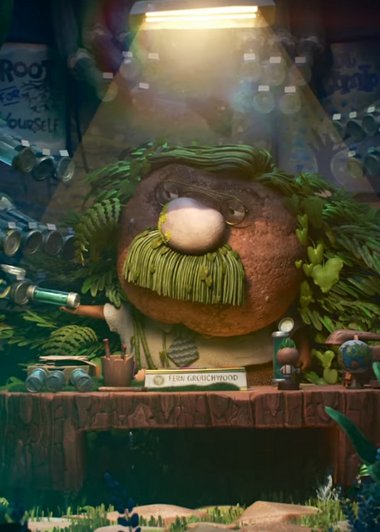
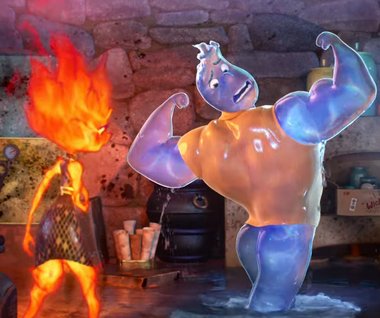
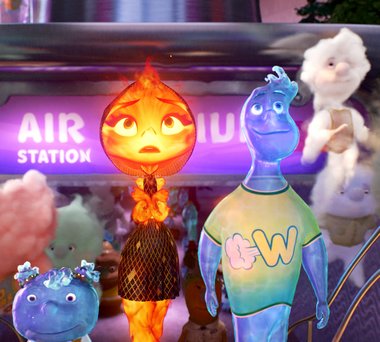
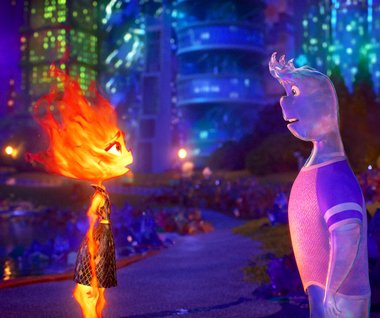
| Featuring |
|---|
|
Leah Lewis … Ember Lumen (voice) Mamoudou Athie … Wade Ripple (voice) Catherine O'Hara … Brook Ripple (voice) Wendi McLendon-Covey … Gale (voice) See all » |
| Director |
|
Peter Sohn |
| Producer |
|
Pixar Animation Studios Walt Disney Pictures See all » |
| Distributor |
There’s some elements in our world—like Fire and Water—that just don’t mix well together… or do they? In Disney/Pixar’s latest kids’ film, we discover just that.
Ember Lumen has always helped her father serve customers at his beloved shop, the Fireplace, ever since she was a little girl. She has been told since childhood that she’ll be able to run the shop on her own one day, when she’s ready. Unfortunately, she often gets irritated with unreasonable or irksome customers, and threatens to blow her top—quite literally. Her dad has advice for controlling her anger, which seems to burn as hot as the unquenchable fire she is made from. Take a breath and form a connection with the customer, he advises. The only problem is, Ember’s anger is usually too far-gone to do this in the heat of the moment, and it ultimately ends in disaster.
On such an occasion, when she runs down into the basement of the shop to avoid letting her anger go too far, a string of problems arise. Little does she know that this moment will also be an important turning point in her journey, because this is when Wade Ripple shows up—and his arrival will soon produce a flood of new emotions and experiences in her young life.
Positive Elements
The names of the characters in this film are clever and creative. Ember Lumen is the main character, and she is made entirely of fire, as are her loving mother and father and all their friends, who are frequent customers at her father’s store.
Like Ember, Wade Ripple is also aptly named. He is composed completely of water, and so are his kind and compassionate mother and father and large extended family.
Both main characters come from loving homes with moms and dads who want what’s best for them. They both care about their families and want to please their parents.
When issues arise for Ember, Wade helps out as best he can, even to the extent of potentially allowing harm to come to himself. He is very self-sacrificing. It’s very important to him to help Ember realize her full potential, which is awesome to see. Wade really cares about the growth of Ember as a person and seeing her achieve her hopes and dreams in life.
Ember’s anger problem is addressed by her father, and he does not agree to let her take over his store until she learns how to control her outburts. It’s good to show children that it’s okay to be angry, but that we need to learn to control our anger and express it in healthy ways. Ecclesiastes 7:9 says,
“Control your temper, for anger labels you a fool.”
James 1:19-20 declares,
“Everyone should be quick to listen, slow to speak and slow to become angry, because human anger does not produce the righteousness that God desires.”
Learning to control one’s anger is important, and this film highlights that, which is commendable.
Of course the movie leaves out something very important, which is that in order to be self-controlled, one must walk by the Spirit. “So I say, walk by the Spirit, and you will not gratify the desires of the flesh.” It is when we are not staying in step with the Holy Spirit that we are prone to let our “flesh” or sin nature reign. However, “Elemental” does show that angry outburts are not okay, and that there are consequences for not having self-control.
Although lying and deception are a part of the storyline, apologies are given, and the film does show that the actions of the characters do have consequences. Parents will need to discuss these plot points with their children and use discretion.
Expectations of parents is another prominent issue that comes up in the movie. Ember believes that her father’s dream in life is to see her take over his shop, and in time she realizes that she might have other talents that she wants to explore instead. Ember’s relationship with her father grows and evolves as she learns to respect and appreciate his sacrifices for her, while also acknowledging her own newly found abilities and aspirations.
Negative Elements
The phrase “lazy ash” is used once, and parents will understand the euphemism. Older kids may pick up on it as well. When something goes wrong and Ember gets upset, she yells “Flame!” as she leaves the shop, using it as a curse word. Ember mentions trying to fix a problem before her father notices.
Ember makes the decision to deceive her father and go against his wishes by spending time with Wade, even though she knows her father wouldn’t approve. The comment is made that, “He doesn’t have to know.” This hearkens back to other children in Disney movies who chose to lie and deceive their parents.
In “The Little Mermaid,” Ariel is forbidden from going to the shipwreck to learn any more about the human world. Her father tells her in no uncertain terms of his displeasure with her curiosity regarding the two-legged creatures above the ocean’s surface. Nevertheless, she rebels, bringing severe consequences upon herself and her family as a result.
In “The Lion King,” Simba’s father Mufasa tells him never to go to the shadowy area of the land, where there’s no light. But Simba ignores his father’s wisdom, much to the peril of Mufasa.
Rebellion is also portrayed in the 2015 film “Inside Out.” When the main character, Riley, is heartbroken over her family’s move from the midwest to San Francisco, she gets on a bus and runs away from home.
The aforementioned Disney films showcase just a few examples of deception and rebellion of children towards their parents. This obviously isn’t anything new coming from Disney.
However, even when reading the Bible we can find examples of children deceiving their parents. Jacob deceived his father into thinking he was his brother Esau so that he could steal his father’s blessing (Genesis 27). Of course, the Bible also tells children to honor and obey their parents.
“Children, obey your parents in everything, for this pleases the Lord.” —Colossians 3:20
The Bible does include true accounts of the actions of real humans, and these people did not always make righteous choices. So too, characters in films and books may not always act as they should, but if there are consequences to their actions, then hopefully that imparts an important lesson onto the viewer (for example, lying can get you in trouble with your parents, ruin your relationship with them, cause other negative events to transpire, and so on).
Wade asks the question, “Why does anyone get to tell you what you get to do in your life?” The rhetorical answer is that no one should be able to. According to society and culture, you should do as you please. But we know that children are commanded in the Bible to obey their parents. Ephesians 6:1 says,
“Children, obey your parents in the Lord, for this is right.”
Even as adults, we answer to a higher authority than ourselves. Yes, we are to obey the laws of the land, but even more than that, we should obey God and do His will. From a biblical standpoint, someone does get to tell us what to do, even as adults. As Christians, we believe in following in Jesus’ footsteps and doing the Lord’s will as He did. Jesus’ prayed for His Father’s will do be done. Jesus said in John 6:38,
“For I came down from heaven, not to do my own will, but the will of him that sent me.”
He also taught His disciples to pray,
“Our Father who art in heaven, hallowed be thy name. Thy kingdom come. Thy will be done on earth as it is in heaven.” —Matthew 6:9-10 (more information)
We need to pray for God’s will and do what pleases Him because He is Holy, He is the Creator and Savior, and He is worthy of our obedience. We can also trust that He knows what’s best for us and has a better plan for our lives than we have for ourselves. Jeremiah 29:11 states,
“For I know the plans I have for you,” declares the LORD, “plans to prosper you and not to harm you, plans to give you hope and a future.”
Spiritual Aspects
A character mentions praying to fire. The family seeks to protect the blue flame that they pray to. Two characters are shown bowing down to each other to show respect and reverence. In another scene, a character mentions that it will take “an act of God” to be able to do something. Ember’s mother mentions something about doing a “reading” on her daughter and Wade, suggesting that she has some sort of fortune-telling abilities. Ember’s mother “reads” the smoke that emanates from wooden sticks lit by couples, and this is a sort of fortune telling process to see if their love will last. She tells Ember that she can “smell love” on her daughter.
Sexual Innuendos
In one scene, the two main characters go on a hot air balloon ride of sorts. As they float up in the night sky, two other characters, who are land people (apple trees) can be seen picking apples off of each other through an open window. When they are spotted, they laugh and giggle and say that nothing is going on “just a little pruning”. Later, this phrase is referred back to in order to ask if there will “be any pruning” allowed on a date. This will likely go over kids’ heads, but also didn’t need to be included.
At one point, Ember misunderstands a comment made to her. She is told, “You’re so hot,” and clearly thinks it is meant to speak of her attractiveness, rather than the fact that she’s literally made of fire. A follow-up comment of “You’re smokin” is made afterwards. Again, these grown-up “jokes” will likely go over many kids’ heads, but are nevertheless something to be mindful of. The two main characters do hold hands and dance together as a test to see whether anything negative will happen, because of the warning that was continually touted, “Fire and Water don’t mix.” The two are seen kissing towards the end of the film.
Wade has a younger sibling, Lake, who is briefly introduced to Ember amongst many other family members. Lake goes by “they/them” pronouns, but the introduction is so subtle that adult viewers may not even notice, much less children. I didn’t even notice it myself, but read about it in an article after viewing the film. This is the first time a “non-binary” character has been introduced in a Disney/Pixar film.
Gay characters sit side-by-side as they are introduced to Ember, but once again, it is very subtle and the characters are composed of water, so it’s not very apparent what their gender is supposed to be. It’s so subtle that adults may not even realize what the scene is portraying, so children will likely not notice either. I also read about it online and did not catch it during the actual scene in the film, because of how large Wade’s family is and the fact that the gay characters don’t speak any lines of dialog or take up more than a couple of minutes (or less) of screen time. That particular scene is more focused on Ember and her burgeoning talents and abilities, and not so much on the orientation of any family members who are present. In fact, more attention seemed to be placed on Wade’s nephews, Marco and Polo, who were swimming around happily, and were also very creatively named.
Other Considerations
Ember’s mother and father are immigrants, and outcasts in a society where the fire people don’t fit in with everyone else and aren’t received as well as the other elements (air, water, and land) seem to be. In a flashback, we learn the reason why Ember’s father has so much hatred towards the water people. Themes of prejudice, anger towards other people groups, and assimilation into culture are explored. Being prejudiced against others is portrayed as a negative thing.
There are a couple of scenes where characters are in peril for a brief period of time, but it is not portrayed in a very frightening manner. In that sense, the movie is suitable for kids, as the action scenes are very mild.
Overview
I took my four young children to see “Elemental.” We all greatly enjoyed the film. While it wasn’t as visually stunning as the classic movies Disney/Pixar has brought us in the past, such as “Toy Story,” “Finding Nemo,” and “Cars,” “Elemental” had a good storyline, intriguing characters, some meaningful life lessons, and a fun, upbeat song that had us dancing in our seats in the movie theater. It had a few tearjerker moments and was more of a heartwarming film than a laugh-out-loud comedy, although there were a couple of funny parts. It would have been nice to see more scenes with the other elements in this imaginary world, such as air and land. Although they are briefly touched upon, the main focus is on the two elements of fire and water.
Parents will need to be aware that this movie has a romantic aspect to it, and is rated PG, so guidance will be needed. Children may need certain phrases or scenes discussed or explained to them later, and it may open up dialog about certain themes such as why lying and deception are wrong, why one must learn to control one’s anger, racism/prejudice, etc. Older or very astute children may notice the references to identifying oneself as gay, non-binary, etc., so parents will need to be cautious. Parents may also need to explain that any sort of fortune-telling is wrong, and that as Christians we only pray to God, not flames or any other substance that is merely part of the creation, and not the Creator Himself. Overall, I would recommend “Elemental” as a movie that parents can watch with their children, with the awareness that it may bring up some points for discussion and instruction.
- Wokeism: Mild
- Violence: Minor
- Profane language: Minor—also “dang” and one “holy dewdrop.”
- Vulgar/Crude language: Minor—also “What the …?”
- Sex: Minor
- Drugs/Alcohol: Minor
- Occult: Minor
- Nudity: None
See list of Relevant Issues—questions-and-answers.


The four main characters in the film animation are the three members of the “fire’ people family: the daughter “Ember Lumen,’ and her father and mother “Bernie’ and “Embert,’ and “Wade Ripple,’ a member of the “water’ people. The voice actor for the daughter “Ember’ was born in China and raised in the USA. The voice actor for her father is from the Philippines, and the voice actor for the role of her mother was born in Tehran, Iran, and grew up in America. The voice actor for “Wade’ is a black man from the African island of Mauritania, who also grew up in America.
The film is a triumph of amazing “state of the art’ animation.
The center of the film is a romantic comedy between “Ember,’ a female “fire person’ and “Wade,’ a male “water person.’ Wade helps Ember to understand that she is a truly beautiful and gifted woman, and Ember helps Wade manifest his courage.
While there is a lot of “slapstick humor’ in the film which would appeal to children, the film contains some of the deepest expressions of romance between a man and a woman which I have ever seen. In the biblical book “Song of Solomon’ (also referred to as the “Song of Songs’), as well as in Milton’s epic poem “Paradise Lost,’ some of the highest expressions of physical love are conveyed in metaphorical imagery rather than in actual physical descriptions. So it is with the film “Elemental.”
Also, one of the most beautiful and heartfelt expressions of one person sacrificing himself for another occurs in this film, who is redeemed in the form of crying tears.
Towards the end of the film, the father “Bernie’ says to his daughter “Embert”: “You were the dream. You were always the dream—meaning that she was truly valued for who she was, rather than having to “perform’ in order to be loved.
Yes, there are some spiritually problematic areas of the film, and yes, here and there the plot falters, but beyond that there are beautiful expressions of love——uniquely expressed in this film—a cartoon for children—more so than in many other films.
Moral rating: Average / Moviemaking quality: 4½
Moral rating: Better than Average / Moviemaking quality: 5
Moral rating: Offensive / Moviemaking quality: no opinion
PLEASE share your observations and insights to be posted here.

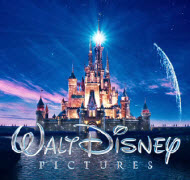
My Ratings: Moral rating: Good / Moviemaking quality: 5